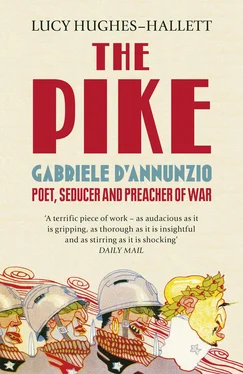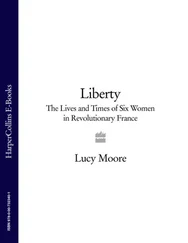His relationship with Barbara gave rise to his Roman Elegies, the first of his mature poem-cycles. Their title is borrowed from Goethe. Their philosophical underpinning is provided by Shelley and Schopenhauer. Their insistence on the correspondances between the material world and human emotion is inspired by the French Symbolists whom d’Annunzio had been reading, but the dazzling achievement of the elegies is d’Annunzio’s own.
By this time the poet was fully in control of his medium. He stretches his verse-form to its limits; he twists it to his emotional purpose, he exploits its rhythms to make effects now plangent, now joyful. In one of the poems Barbara is named. In all of them she is the ‘the one who was at my side’, and she was among his first readers. In the poems describing the early stages of their affair, happiness beats through the lines. One afternoon, in the gardens of the Villa d’Este with Barbara, d’Annunzio wrote two versions of an elegy in which he claims that the fountains, the roses, the trees, every leaf and stalk of the marvellous Tivoli gardens owed their beauty and their gushing life to her. Both manuscripts survive, one dated five o’clock and one six o’clock of the same June afternoon.
He couldn’t get enough of Barbara; he was racked whenever they were apart by his insatiable craving for her body. Several of his biographers have described her as the love of his life, but the word he uses most often in his letters to her is not ‘love’, but ‘desire’. Readers of Pleasure imagined the novel’s author to be a nonchalant seducer like Andrea Sperelli, who makes love to his friend’s mistress for no reason whatsoever, out of idleness and vanity. But d’Annunzio was not a careless Don Juan. His appetite for sex has been the occasion for much salacious merriment, in his lifetime and ever since, but it was often cruel, to others and to himself as well.
Centaurs, chimeras, satyrs and other hybrid beings recur in his imaginative work. Repeatedly, he describes himself as a faun: a feral half-human, smooth-skinned homo sapiens from the waist up, a hairy beast below. Fauns were fashionable. D’Annunzio had read Mallarmé’s famous poem, but for him the image expressed a fundamental conflict. Sometimes the self-description is gleeful, the conceit of a physically self-confident young man pleased to see himself as a mischievous animal. Sometimes it hints at self-loathing and shame.
A few weeks after he met Barbara, d’Annunzio was summoned to Pescara to help deal with a family crisis. His father, Francesco Paolo, had been running through money at a disastrous rate. D’Annunzio’s mother’s inheritance was all but gone. There was little chance of finding dowries for his sisters. Over the next six years, d’Annunzio was to find his own financial problems greatly aggravated by his father’s. He would be sending handouts to his mother for the rest of her life.
It is nearly always unwise to imagine one can deduce anything certain about a novelist’s life from a reading of his fiction, but d’Annunzio’s The Triumph of Death (begun in 1889 and published in its final form five years later) is an exceptional case. It is a novel in which the author’s own love letters are quoted verbatim, and one which describes in exact detail the place in which it was first written. D’Annunzio told Romain Rolland that it was ‘not imaginary at all’. Its hero, Giorgio Aurispa, a sophisticated young city-dweller like d’Annunzio, revisits his family in the Abruzzi. His fictional father is a portrait of d’Annunzio’s real one. More painfully, it is also a kind of self-portrait: the author as seen in a hideously distorting glass.
When he went to see Francesco Paolo that summer of 1887, d’Annunzio himself was already spending way over his income. Aurispa’s father, like d’Annunzio’s, is plundering his wife and children’s home to pay his mistress’s expenses. D’Annunzio was renting a room for his meetings with Barbara with money desperately needed by his legitimate family. The fictional father is shifty, telling transparent fibs. D’Annunzio, still living with his wife but meeting Barbara nearly every day, must have been lying hour by hour. Aurispa is fastidious and physically refined. So was d’Annunzio, the neat little man who even as a schoolboy was already spending inordinate sums on laundry. Aurispa contemplates his father: ‘Fat, full-blooded and powerful, a hot breath of carnal vitality seemed to emanate from his whole person … His face bore the impress of a violent and harsh nature … All this inspired him [Aurispa] with a feeling akin to nausea … And I, I am the son of this man!’ Looking at his real-life father, d’Annunzio likewise recoiled as though from a hideous caricature of himself. Like the picture in Dorian Gray’s attic (Oscar Wilde’s novel would be published in the same year as the first instalment of The Triumph of Death), Francesco Paolo d’Annunzio was the image of his son’s worst faults. If the son was a faun – a pretty creature from an artificial pastoral – the father was the stinking goat that begot him.
Конец ознакомительного фрагмента.
Текст предоставлен ООО «ЛитРес».
Прочитайте эту книгу целиком, купив полную легальную версию на ЛитРес.
Безопасно оплатить книгу можно банковской картой Visa, MasterCard, Maestro, со счета мобильного телефона, с платежного терминала, в салоне МТС или Связной, через PayPal, WebMoney, Яндекс.Деньги, QIWI Кошелек, бонусными картами или другим удобным Вам способом.












